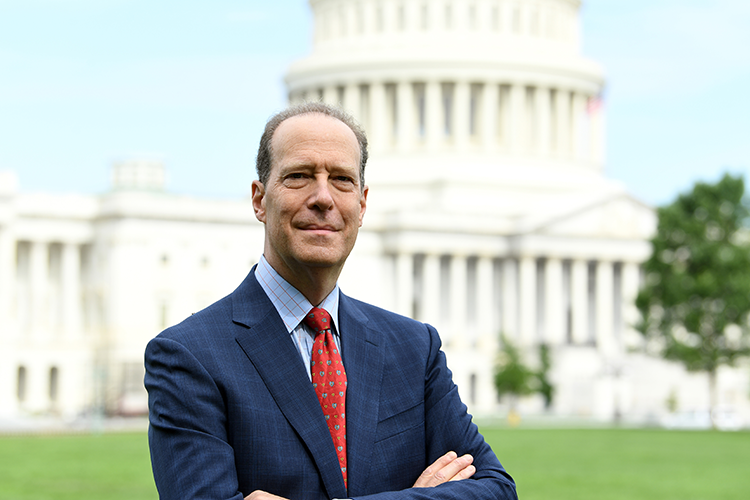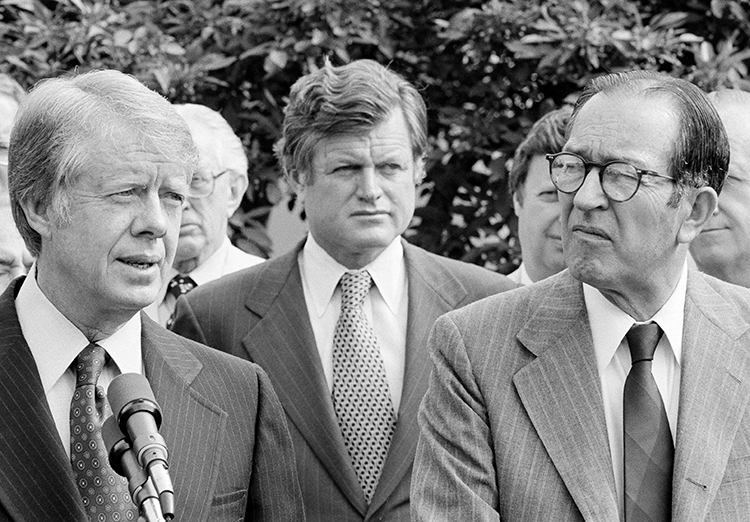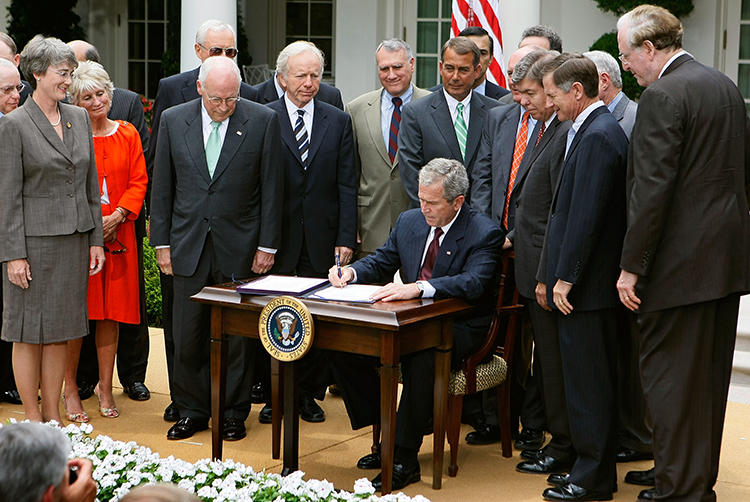Should the US reform a key foreign intelligence program? ABA members join the debate

Glenn Gerstell, a former general counsel for the National Security Agency, is raising awareness of the Section 702 debate as a member of the ABA Standing Committee on Law and National Security. (Photo by Jocelyn Augustino)
In his five years as general counsel of the National Security Agency, Glenn Gerstell became deeply familiar with Section 702, a provision of the Foreign Intelligence Surveillance Act that allows the government to obtain electronic communications from foreigners outside of the United States.
Gerstell ensured his team complied with the law’s requirements at all steps, from collection through reporting, he says, and because of their surveillance, he saw firsthand how valuable acquired information was to national security. Now, amid an intense debate over proposed reforms to Section 702, which is set to expire at the end of the year, he has written and spoken extensively about his experience.
“I really feel like I have a duty to share the knowledge that I gained,” says Gerstell, a member of the ABA Standing Committee on Law and National Security, which created a Section 702 resource page for policymakers and members of the public. “I genuinely think it’s in our nation’s interest to reauthorize this vital authority given the threats that are out there.”
“I’m absolutely personally open to discussing possible amendments and further enhancements to the statute—I don’t think anything’s carved in stone forever,” adds Gerstell, who is also a senior adviser to the Center for Strategic & International Studies’ International Security Program. “But I do feel very strongly that it should be reauthorized and maintain its operational effectiveness.”
 When President Jimmy Carter announced the Foreign Intelligence Surveillance Act on May 17, 1977, it was proposed as a way to protect Americans from government electronic surveillance. (AP Photo/Bob Daugherty)
When President Jimmy Carter announced the Foreign Intelligence Surveillance Act on May 17, 1977, it was proposed as a way to protect Americans from government electronic surveillance. (AP Photo/Bob Daugherty)What is Section 702, and why is it controversial?
The Foreign Intelligence Surveillance Act was passed by Congress and signed by President Jimmy Carter in 1978. It outlined procedures for electronic surveillance for foreign intelligence purposes and established the U.S. Foreign Intelligence Surveillance Court to hear applications for and grant orders approving electronic surveillance.
Congress has amended the statute several times, including in 2008, when it introduced Section 702. This provision permits the attorney general and director of national intelligence to jointly authorize the collection of specific types of foreign intelligence, such as information related to international terrorism or cyberattacks.
 President George W. Bush signed the Foreign Intelligence Surveillance Act reauthorization that introduced Section 702 on July 10, 2008. (Photo by Mark Wilson/Getty Images)
President George W. Bush signed the Foreign Intelligence Surveillance Act reauthorization that introduced Section 702 on July 10, 2008. (Photo by Mark Wilson/Getty Images)Under Section 702, the government targets non-U.S. persons who are reasonably believed to be outside the United States and thought to possess foreign intelligence. Because many foreigners use email and cellphone accounts managed by U.S. electronic communication service providers, the statute allows the government to compel these companies to assist with surveillance.
Individual court orders are not required for each target. Instead, the Foreign Intelligence Surveillance Court annually reviews the categories of foreign intelligence the government collects and its procedures for collection to ensure they comply with Section 702 and remain consistent with the Fourth Amendment. This includes specific procedures aiming to protect information that is incidentally acquired from any U.S. person who communicated with a targeted foreigner.
As Congress considers reauthorizing Section 702, both Democratic and Republican lawmakers have said they won’t vote to renew the current statute because of disclosures the FBI wrongly searched Section 702 data while investigating Americans. According to the Associated Press, this included improper searches for information related to the January 2021 riot at the U.S. Capitol and 2020 protests following the murder of George Floyd.
Members of the ABA as well as the greater legal community are part of the national conversation over whether Section 702 should be amended and what changes could better protect Americans’ privacy and civil liberties. One often-discussed reform would require the National Security Agency, Central Intelligence Agency, FBI and National Counterterrorism Center—the four federal agencies that receive Section 702 data—to obtain a court order before accessing any communications of U.S. persons.
Gerstell contends that Section 702 has proven its usefulness, acquiring information relevant to national security from about 246,000 foreign targets in 2022. While there are rules around when the FBI can search for U.S. citizens in surveillance data—including whether there is reason to believe they have foreign intelligence—the FBI agreed in recent years to implement several reforms to improve its compliance with the statute.
In July, Gerstell adds, the President’s Intelligence Advisory Board voted unanimously to support the reauthorization of Section 702 while also making 13 recommendations to increase the public’s confidence in the statute. These recommendations do not include a court order or warrant requirement.
“The FBI has put in place new rules to fix this problem, and there’s no indication in the past year that this continued to be the subject of compliance incidents and abuse the way it had been before,” Gerstell says. “So, let’s see if these new rules are working. And then if it looks like in two, three years, we need to curtail it or fix it, let’s do that. That’s the argument the administration is making.”
 Stewart Baker is another former general counsel of the National Security Agency, and is working with the ABA Standing Committee on Law and National Security’s Advisory Committee as a special advisor.
Stewart Baker is another former general counsel of the National Security Agency, and is working with the ABA Standing Committee on Law and National Security’s Advisory Committee as a special advisor.Stewart Baker, a special advisor to the ABA Standing Committee on Law and National Security’s Advisory Committee, says requiring intelligence agencies to obtain court approval before conducting searches involving Americans would be detrimental.
It would not only make information involving national security difficult to access, but also could potentially cripple the country’s intelligence capabilities, says Baker, of counsel at Steptoe & Johnson who previously served as general counsel of the National Security Agency.
“It would slow down every single search the FBI does for national security purposes through data the government has already gathered,” Baker says. “So, you want to do a second search through data we have? You have to get a warrant. You have to gather all this evidence, submit it to a judge and wait for the judge to say yes.
“Whereas now, you type in a name, and you say, ‘Is there a communication between the person I’m interested in and the suspect abroad?’ “
Meanwhile, Baker understands concerns over the FBI’s problematic searches and has spent the past year talking with lawmakers about focusing instead on reforms that would, in general, help eliminate partisan bias in surveillance. As examples, he says Congress could prohibit the politically motivated use of intelligence authorities; or require the Foreign Intelligence Surveillance Court to appoint amicus curiae to challenge the government in cases involving sensitive investigations.
What concerns have been raised over privacy and civil liberties?
 Elizabeth Goitein, senior director of the Brennan Center for Justice’s Liberty and National Security Program, calls Section 702 “a bait and switch that drives a hole through the protections of the Fourth Amendment.”
Elizabeth Goitein, senior director of the Brennan Center for Justice’s Liberty and National Security Program, calls Section 702 “a bait and switch that drives a hole through the protections of the Fourth Amendment.”Elizabeth Goitein brings a different perspective to the debate, and in particular, what she calls “warrantless searches” of Americans’ communications.
Goitein, senior director of the Brennan Center for Justice’s Liberty and National Security Program, explains that to specifically target Americans, the government must first obtain a warrant for a criminal investigation or what’s known as a Title 1 order under the Foreign Intelligence Surveillance Act for a foreign intelligence investigation. However, she says, because Section 702 surveillance inevitably captures large amounts of Americans’ communications, the FBI and other intelligence agencies are able to conduct so-called “backdoor searches” through this information.
This practice is common, adds Goitein, who has participated in several ABA Standing Committee on Law and National Security programs. According to an Office of the Director of National Intelligence annual report, the FBI performed about 204,000 U.S. person queries in Section 702-acquired data between December 2021 and November 2022.
“They have certified to the FISA court that they don’t have to get a warrant because they’re only targeting foreigners, but as soon as they have the information, they go rummaging through it looking for Americans’ communications,” she says. “Whether it is constitutional or not, which the courts are still hammering out, by the way, it is a bait and switch that drives a hole through the protections of the Fourth Amendment.”
The 2nd U.S. Circuit Court of Appeals at New York is one federal court that has considered these searches. In 2019, the court said collecting U.S. persons’ communications during surveillance of foreigners abroad does not violate the Fourth Amendment. But it also said searching the Section 702 database for evidence involving a U.S. person could raise constitutional issues and remanded the case for further review.
Patrick Toomey, a co-chair of the ABA Section of Civil Rights and Social Justice’s National Security and Civil Liberties Committee, also has had extensive discussions about Section 702 in recent months. Like Goitein, he believes Congress should impose a warrant requirement for backdoor searches of Section 702 data. He also highlights a longer list of potential reforms to help protect Americans’ constitutional rights.
Among them is limiting the scope of Section 702 surveillance so fewer Americans’ communications are swept up during foreign intelligence investigations overseas, says Toomey, the deputy director of the ACLU National Security Project.
“Foreign intelligence is defined incredibly broadly in the statute,” he says. “So, for targets under Section 702 right now, there doesn’t have to be any showing of wrongdoing. There doesn’t have to be suspicion of criminal activity. The person doesn’t have to be suspected of engaging in any type of terrorism-related conduct. It’s a very permissive standard.”
Other reforms could include strengthening oversight within the Foreign Intelligence Surveillance Court and ensuring judicial review is available in the ordinary federal courts, Toomey says. While bipartisan groups within Congress and civil society are calling for these types of changes, he says, initial legislative proposals related to Section 702 have not been released.
“What the coalition of civil society and privacy organizations—and many members of Congress—are advocating for is a set of reforms that would preserve that value in collecting foreign intelligence abroad while imposing those strong bedrock safeguards for Americans that the Constitution requires,” Toomey says.
In September, the U.S. Privacy and Civil Liberties Oversight Board, an independent agency within the executive branch, released results from its own study of Section 702. While all five board members agreed the statute should be renewed, they were split over what reforms are needed.
In its 19 recommendations, the three-member Democratic majority supports requiring the government to seek approval from the Foreign Intelligence Surveillance Court before accessing communications of Americans. The two Republican members, however, refused to sign the report and objected to several of its recommendations in a separate statement.



